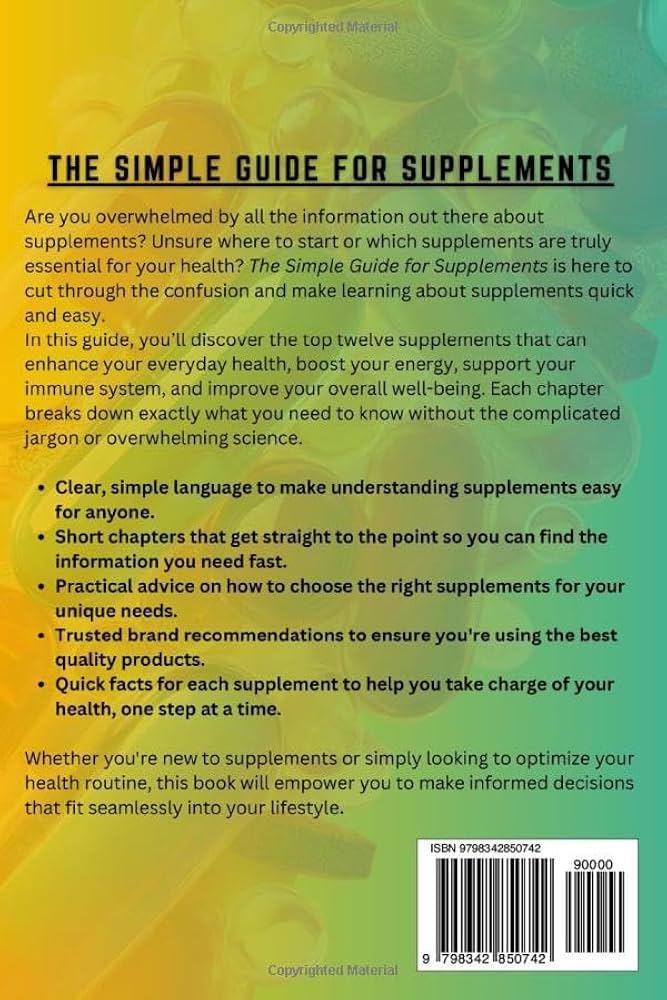In a world brimming with countless vitamins, minerals, and herbal extracts, the quest to find the perfect supplement can feel like navigating an endless maze. Each label promises enhanced energy, sharper focus, or better immunity—but how do you cut through the noise and select what truly fits your unique body and lifestyle? Choosing the right supplements isn’t just about following trends or the latest health craze; it’s about understanding your own needs, goals, and how diffrent ingredients interact with your system. This guide will illuminate the path, helping you make informed choices that support your well-being with clarity and confidence.
Understanding Your Body’s Unique Nutritional Gaps
Every individual’s body is a unique ecosystem, influenced by genetics, lifestyle, and habitat, which shapes its specific nutritional requirements. to effectively bridge these gaps, it’s essential to understand where your body may be falling short. instead of guessing or following generic advice, consider factors such as dietary habits, existing health conditions, and activity levels. For exmaple, those on plant-based diets might need extra attention to vitamin B12 and iron, whereas someone living in a northern latitude could require additional vitamin D due to limited sun exposure.
Using simple tools and tests can bring clarity to your nutritional status. Blood panels and micronutrient tests offer valuable insights into deficiencies that might not yet manifest as symptoms.Here’s a speedy reference to common nutritional shortfalls and thier typical causes:
| Common Deficiency | Primary Cause | Symptoms to Watch For |
|---|---|---|
| Vitamin D | Limited sunlight exposure | Fatigue, bone pain |
| iron | Inadequate dietary intake, menstruation | Weakness, pale skin |
| Magnesium | High stress, poor absorption | Muscle cramps, irritability |
| Omega-3 Fatty acids | Low fish consumption | Joint stiffness, dry skin |
- Evaluate your diet with trusted resources like the USDA’s MyPlate tool to identify potential gaps.
- Monitor bodily signs and symptoms as early indicators of deficiencies.
- Consult with healthcare professionals for tailored testing.

Evaluating Supplement Quality and Ingredient Transparency
When selecting supplements,it’s crucial to scrutinize not just the ingredient list,but also the source and purity of those ingredients. Products that openly display third-party testing certificates and provide batch-specific facts offer a higher level of assurance, highlighting their commitment to transparency and safety. Always look for supplements manufactured in GMP-certified facilities, as this certification indicates adherence to stringent manufacturing standards designed to ensure product quality and consistency.
Transparency extends beyond labeling—it’s about understanding what you’re putting into your body. Reliable brands often supply detailed information on ingredient origin, bioavailability, and potential allergens. To get started,consider these key factors:
- Certification labels: USP,NSF International,or ConsumerLab Verification.
- Clear dosages: Obvious ingredient amounts instead of proprietary blends.
- Ingredient sourcing: Identifiable,sustainably sourced raw materials.
- Customer reviews: Verified feedback on efficacy and side effects.
| Quality Indicator | What to Look For | Why It Matters |
|---|---|---|
| Third-Party Testing | Certificate of Analysis (CoA) | Verifies purity and potency |
| Manufacturing Standards | GMP Certification | Ensures safety and consistency |
| Ingredient Transparency | Complete label details | Informs dosage and allergen risks |
For more guidance on evaluating supplement brands, resources like
balancing Benefits with Potential Risks and Interactions
When incorporating supplements into your routine, it’s essential to weigh the positive effects against the possibility of adverse reactions or interactions with othre medications. Supplements can provide targeted nutrients missing from your diet, improve energy levels, or support specific health goals. However, like any substance you introduce to your body, they can also carry potential risks if misused. For example, taking excessive doses of fat-soluble vitamins like A, D, E, or K can lead to toxicity, while some herbal supplements may interfere with prescription drugs by altering their metabolism. Educating yourself on these aspects empowers you to make safer, more informed choices.
Consider the following precautions to optimize benefits and minimize risks:
- Consult with a healthcare professional before starting any new supplement, especially if you have chronic conditions or take medications.
- Research credible sources such as the National Institutes of Health or the Food and drug Governance for reliable supplement information.
- Be aware of your body’s reactions—discontinue use and seek advice if you experience unusual symptoms.
- Keep a detailed list of all supplements and medications and share it with your healthcare provider to avoid dangerous interactions.
| Supplement Type | Potential Interaction | Safety Tip |
|---|---|---|
| Vitamin K | May reduce effectiveness of blood thinners | Consult doctor if on anticoagulants |
| St.John’s Wort | can interfere with antidepressants and birth control | discuss with healthcare provider |
| Calcium | May hinder absorption of certain antibiotics | Avoid taking simultaneously |
Informed decisions backed by trusted resources and professional advice create a balanced approach, allowing you to safely harness the full potential of supplements tailored to your health journey.

Tailoring Your supplement Routine to Lifestyle and Goals
When crafting a supplement regimen, it’s crucial to consider both your daily habits and long-term objectives. A sedentary professional aiming for enhanced cognitive function will likely benefit from nootropics and omega-3 fatty acids, whereas an active individual focused on muscle recovery might prioritize branched-chain amino acids (BCAAs) and protein powders.Beyond your goals, factors like meal timing, sleep patterns, and stress levels can influence how your body absorbs and utilizes supplements. Tailoring intake to fit seamlessly into your lifestyle ensures consistency, maximizing the potential benefits over time.
Keep in mind these essential considerations to align supplements with your life:
- activity level: Adjust types and doses according to exercise frequency and intensity.
- dietary habits: Identify nutrient gaps from your meals to avoid over-supplementation.
- Medical conditions: Consult professional guidelines, such as those from the CDC, for any contraindications.
- Personal goals: Weight management, mental performance, immunity, or athletic prowess all require different supplement focuses.
| Lifestyle | Recommended Supplements | Key Benefit |
|---|---|---|
| Busy Professional | Omega-3, Multivitamin, Adaptogens | Improved Focus & stress Resilience |
| Endurance Athlete | Electrolytes, BCAAs, Vitamin D | Hydration & Muscle Recovery |
| Plant-Based Diet | B12, Iron, Zinc | Correct Nutrient Deficiencies |
Personalizing supplements to fit seamlessly into your daily routine not only boosts effectiveness but helps avoid needless intake. For detailed nutrient recommendations and safety tips, resources like the National Institutes of Health serve as invaluable guides in refining your approach.
Future Outlook
Choosing the right supplements is a journey, not just a one-time decision. By understanding your unique needs, researching ingredients, and listening to your body, you empower yourself to make informed choices that support your health and well-being. Remember,supplements are tools—not magic pills—and when chosen wisely,they can beautifully complement the foundation of a balanced lifestyle. So take your time, stay curious, and let your path to better health be as thoughtful as it is purposeful.




